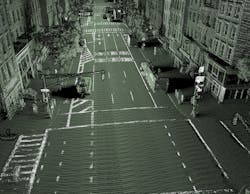Innoviz refueled in the race to supply inexpensive lidar sensors for autonomous cars. The company said on Thursday that it had raised $65 million in a funding round led by automotive suppliers Delphi and Magna International.
LeddarTech, which created a custom chip for the heart of its lidar system, also said on Thursday that it had ended months of fundraising with $101 million from Germany’s Osram, which already owns a quarter of the business, as well as parts suppliers Magneti Marelli and Delphi.
Both firms are targeting new lidar sensors, which scan roads by calculating how lasers reflect from objects like stop signs, buildings, and traffic lights. But neither firm has had significant financial firepower: Innoviz, founded less than two years ago, had raised $9 million, while LeddarTech raised $16 million since its founding in 2007.
Their solid-state lidar contrast the spinning devices from Velodyne, the biggest supplier of the technology. Velodyne’s devices are shaped like coffee cans and mechanically sweep laser beams to create digital maps of a car’s surroundings. Each lidar unit can cost thousands of dollars.
Innoviz’s plan is to make solid-state lidar more compact, more reliable, and cheap enough so that a single unit can eventually be sold for around $100. The cost, however, will be higher at first. In addition, cars will need multiple lidar to cover the same area as Velodyne’s sensors.
“We have moved from the concept and prototyping stage to development and now mass production very quickly, and we expect to move very quickly during the next phase of our growth as well,” said Omar Keilaf, Innoviz’ chief executive.
In the first quarter of 2018, Innoviz plans to sell a lidar unit for testing and development of self-driving cars. After that, the company will start sampling more advanced lidar for cars that take the wheel out of human hands during highway and city driving in 2019.
LeddarTech will spend its funding on hiring engineers and fostering programs with Tier 1 auto suppliers. The Canadian firm is aiming to ship samples of a lidar for autonomous cars before the end of this year, and more advanced parts for higher levels of self-driving next year.
Innoviz said that its lidar’s range is around 200 feet, while algorithms to improve image quality and filter out interference from lidar lasers on other cars. Innoviz declined to share details about its proprietary technology, which it describes as a system more than a mindless sensor.
“The more advanced the lidar, the more exact the vision will be,” Keilaf told Electronic Design in an email. “In order to develop an entire autonomous driving stack, we enable a strong base and on top of our lidar technology we have also embedded software capabilities, including a deep learning algorithmic layer.”
The software “allows us to enhance the vehicle’s sensing abilities and reach high levels of perception, including computer vision capabilities to enable the vehicle to identify objects and classify them,” Keilaf said. Doing so enables lidar to “simultaneously map and identify exact locations in the surroundings without GPS,” in a process called localization.
By measuring laser reflections from objects around the vehicle, lidar can provide redundancy for other sensors like radar and cameras, which are already standard for autonomous cars. These sensors can be tricked in direct sunlight, rain, highway signs, or at night.
LeddarTech developed an ASIC chip to generate cleaner return signals from its lidar systems, which can also be used in drones and factory vehicles. That enables lower detection thresholds, for significantly increased range and sensitivity over other solid-state lidar, the firm says.
Many companies are vying for solid-state lidars with higher resolution, lower price, and longer range. Competitors include Oryx Vision – which recently raised $50 million for lidar that uses tiny antennas instead of optical sensors to read the reflections of laser light – as well as Luminar Technologies and Quanergy Systems.
Osram has also entered the ring with claims that it has created lidar that can be sold for less than $50. It plans to start production next year. Infineon, through its acquisition of Innoluce, is targeting lidar based on one-dimensional mirrors that can be cheaply manufactured with semiconductors tools.
Innoviz is not resting after the recent financing, and the company plans to close a second part of the funding round soon. With its newly restocked coffers, the Tel Aviv-based company intends to hire engineers, designers, and operations and sales staff. It currently employs 75 people.
Innoviz has also signed commercial deals with both Magna International and Delphi, which also holds a minority stake in the business. “Now it is a matter of getting our devices into more vehicles,” Keilaf said.
Updated September 8th, 2017: This article originally focused on Innoviz, which announced a $65 million funding round Thursday. But later that same day, LeddarTech announced that it had closed a $101 million round. This article has been updated to reflect LeddarTech's announcement. The title has also been changed.
About the Author
James Morra
Senior Editor
James Morra is the senior editor for Electronic Design, covering the semiconductor industry and new technology trends, with a focus on power electronics and power management. He also reports on the business behind electrical engineering, including the electronics supply chain. He joined Electronic Design in 2015 and is based in Chicago, Illinois.

